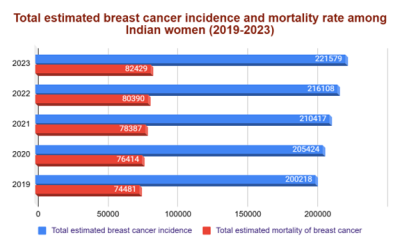Breast cancer is the most common cancer accounting for 26.6% of all cancer cases among Indian women. 13 out of every 100 females diagnosed with breast cancer die on average in India (global cancer observatory 2022 report). The rate is alarming especially at a time when the total number of breast cancer patients is predicted to be more than 1.68 million by 2030( nature article). This makes it of urgent need to consider breast cancer as a serious threat to life.
 Source: Sansad document
Source: Sansad document
The likelihood of a woman to develop breast cancer during her lifetime depends on various factors as summarized as follows:
–> Women at a higher risk of getting breast cancer:
- Prior medical history of radiation exposure
- Age >=40 years
- Inherited gene mutation like BRCA1 & BRCA2
- Prior breast related health issues
- Higher breast density
- Never pregnant/first child after 35 years of age
- Early menstruation and late menopause
- Undergoing post-menopausal hormone therapy
- First line family history related to breast cancer
–> Women at moderate risk of getting breast cancer:
- Obese
- Age < 40 years
- Alcohol consumers
- Smokers including second hand smoking
–> Women at low risk of getting breast cancer:
- Longer duration of breastfeeding
- Regular physical activity
- Having normal BMI
- Taking healthy diet
Since prevention is always better than cure, especially for such a deadly disease like breast cancer, various preventive measures have evolved over time to reduce the likelihood of getting cancer. Some of these include – preventive surgery and preventive medications, genetic testing, etc.
Preventive surgery includes preventive mastectomy and salpingo oophorectomy. Preventive mastectomy involves removal of either or both breasts. It has been found to reduce the risk of getting breast cancer by 90% (national cancer institute) . Implant based breast reconstruction can be followed post-surgery to prevent changes in physical appearance of the body. Bilateral preventive salpingo oophorectomy involves surgical removal of both ovaries and associated fallopian tubes. Though primarily employed for reducing risk of ovarian cancer, it reduces risk of breast cancer as well by 50%. Being irreversible, prior considerations like childbearing, age related family history of cancer, etc. are necessary. Due consultation with healthcare professionals like genetic counselors is thus recommended.
With respect to preventive medications, we have chemoprevention. This involves consumption of estrogen-blockers such as selective estrogen receptor modulators and aromatase inhibitors. But these should be consumed only under supervision of a registered medical doctor due to potential side effects.
Gene testing involves analysing DNA to test the presence of inherited cancerous mutations like BRCA1 and BRCA2 in the body. Women having the presence of such genes in their DNA can work upon other factors like body weight, healthy diet, regular exercise, consumption of alcohol and smoke etc. in a more conscious manner. Also, such women are more likely to be proactive and concerned towards the health of their breast through regular mammography, clinical breast examination, magnetic resonance imaging (MRI), tissue sampling (biopsy) and help in detection of the disease at an early stage and formulate further course of action in a timely manner.
With development in the healthcare infrastructure, various hospitals in India are providing services in the domain of preventive breast cancer. Hospitals providing preventive surgery and genetic testing services in India- max healthcare, Yashoda, Apollo, Medanta, Fuda cancer center, Jawaharlal Nehru Cancer Hospital & Research Centre, etc.
The preventive breast cancer service is bound to witness a higher number of customers in coming times. Hospitals providing such services must keep themselves updated with the preferences of customers, locational aspects i.e. closer to home, pocket size, etc. Through real time analysis of data, hospitals would be able to serve their customers in a more satisfactory manner. At this juncture, Vaults Insights aims to help these hospitals. Through providing real time research on various factors like demography of targeted population, economic factors, location factor, etc. Vaults Insights would help hospitals get a knack over requirements of the preventive breast cancer industry. It would help hospitals witness growth and better service delivery and eventually help in reducing breast cancer mortality rate in India.
